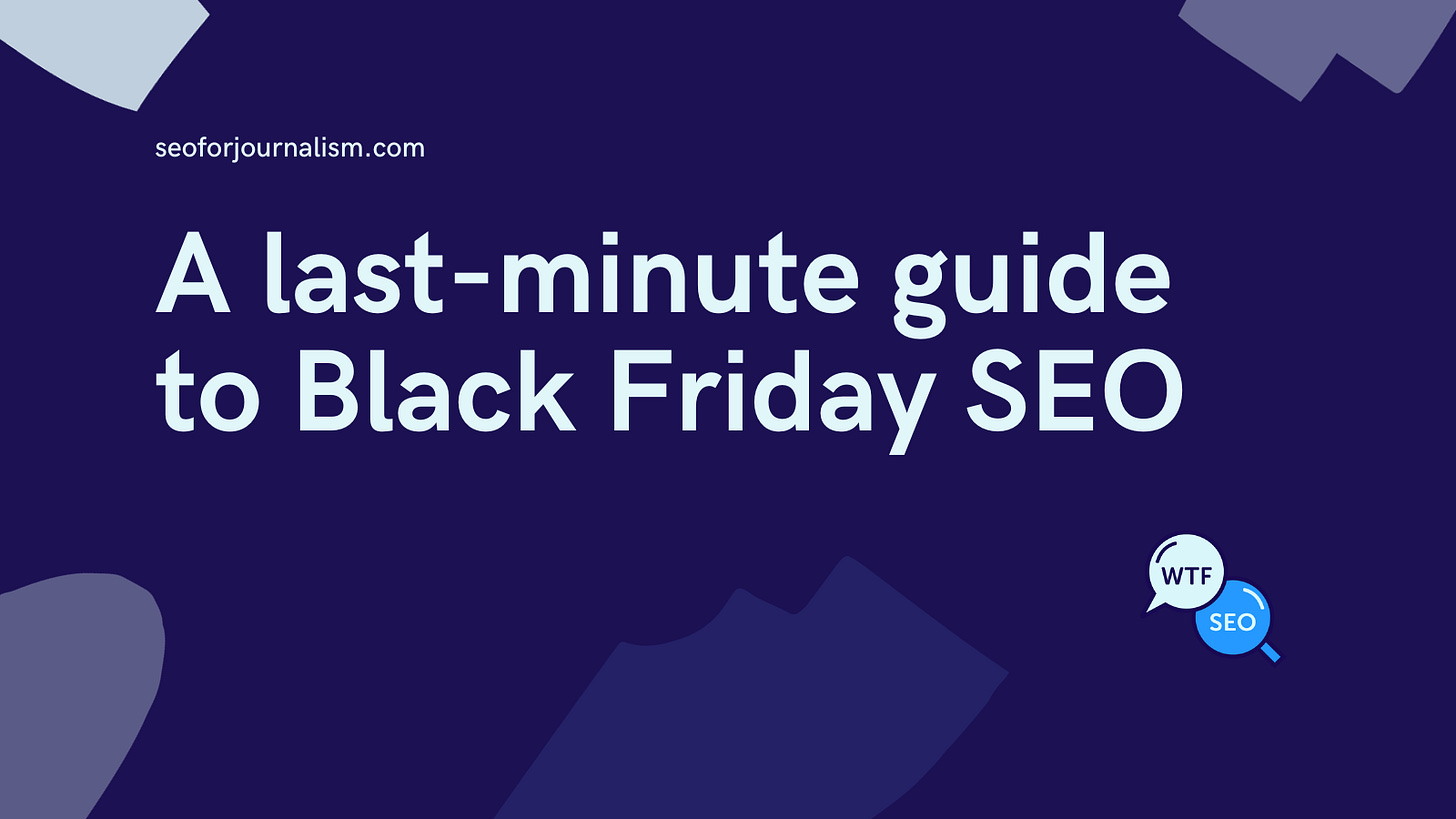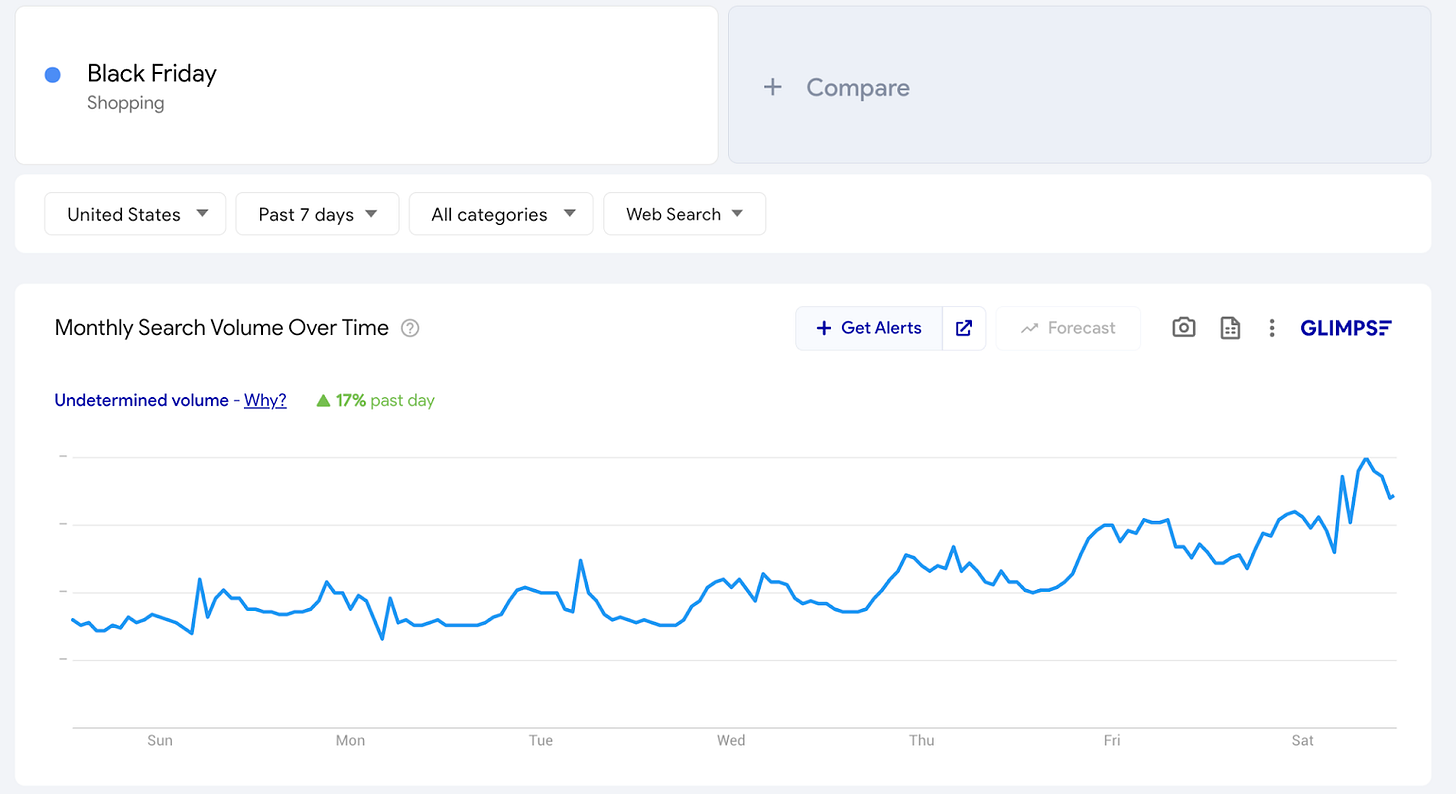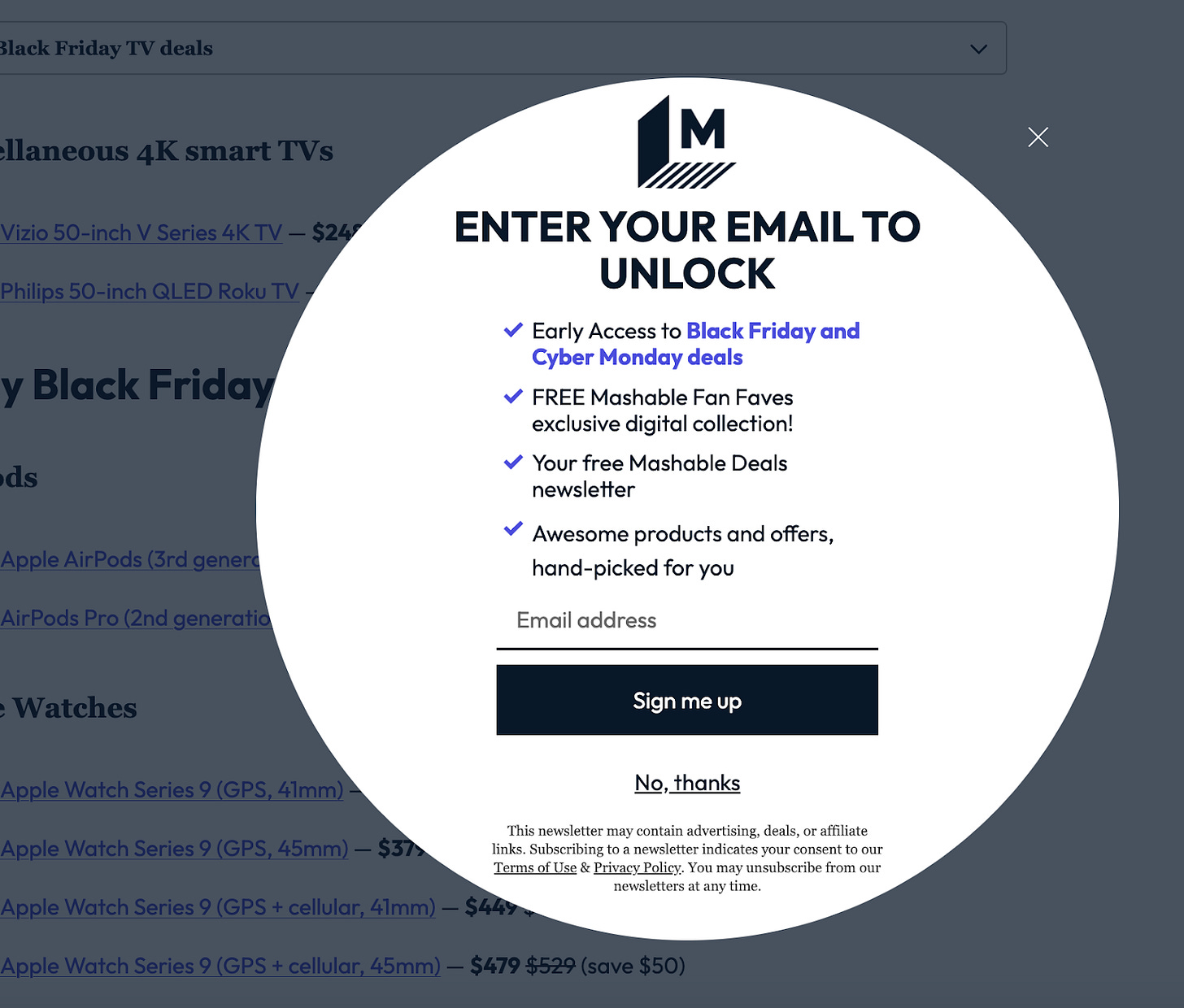A last-minute guide to Black Friday SEO
The countdown to the biggest shopping day of the year is on. Here are our last-minute Black Friday affiliate marketing SEO tips.
#SPONSORED
Trisolute News Dashboard: Award-winning Google visibility tool just for news publishers
The Trisolute News Dashboard is the best-in-class, award-winning news SEO tool for online news publishers since 2012. We demystify the search universe to increase publishers’ visibility with near-real time data & actionable insights while boosting search authority on Google News, SERPs & Discover.
Hello, and welcome back. Shelby here, back in the saddle after a week wandering the south coast of Iceland. There are few things better than seven days road tripping to every possible waterfall, hiking through ice caves or discovering drinkable Skyr yogurt. I’m already planning my return trip.
This week: It’s Thanksgiving week in the United States! That means while most Americans are stuffing their faces with turkey and watching a marathon of football, they're also counting down to the biggest shopping day of the year. To help your teams prepare for the Big Event™, we cover the best practices for Black Friday affiliate marketing.
Join our Slack community to chat SEO any time.
Take our readership survey. (As a token of our appreciation, all participants will be entered into a draw for a USD$50 Amazon gift card.)
Let’s get it.
In this issue:
What is affiliate marketing SEO?
Why is it important for Black Friday?
7 tips for an effective Black Friday strategy
THE 101
What is affiliate marketing SEO?
Affiliate marketing SEO is the process of optimizing stories that use referrals to sell products or services, where the publisher makes a commission off the purchase. The goal, ultimately, is for readers to click an affiliate link and buy a product.
These pages include roundups of the best products in a category, a one-time deal or cover products during an event (in the case of this newsletter issue: Black Friday).
Affiliate SEO requires you to focus on commercial and transactional keywords, instead of informational intent keywords like we do for regular news SEO.
Commercial keywords represent searchers looking to investigate brands or services. These searches tend to focus on learning more about a product of service, comparing the products or looking for the best price. For example,
“best chromebooks” or “ipad vs ipad air.”Listicles, roundups or reviews are used to target these keywords.Transactional keywords are more direct and have the strongest intent to take action. These queries tend to happen after someone has already made a decision on what they are going to purchase, and possibly from where.
“Macbook black friday,”or“buy airpods pro”are examples of transactional intent. We can target deals pages or lists with the best prices for certain products with these keywords.
Affiliate SEO targets a different type of audience due to the search intent. By utilizing affiliate marketing, you can reach a wider net of consumers for your publication.
🔗 Read more: We’ve written in-depth about what affiliate SEO is, and how to set up a solid strategy if you are just starting out.
Why affiliate marketing SEO — especially during Black Friday — is essential for publishers
According to the Digital Marketing Institute, 53 per cent of consumers research products on a search engine like Google before deciding whether or not to invest in a product or service. Over 2.14 billion shoppers now purchase items online, making 27 per cent of all people digital buyers, according to Tidio. That’s a lot of people looking online for the best price, product or resource to spend their money on.
Black Friday is one of the — if not the — biggest shopping days of the year in the U.S. It is a huge traffic and revenue opportunity for publishers. A news organization can greatly benefit from an affiliate marketing strategy that provides consumers the best information available to make an informed purchase.
Affiliate programs are effective for publishers, then, because they provide an alternative form of revenue for publishers that is separate from advertising or subscriptions. It also expands the trust, expertise and authority of a publisher — if done correctly. A publisher that provides a good affiliate experience is likely to get return readers, and sell a higher level of products during an event like Black Friday.
Affiliate SEO requires a heavy emphasis on E.E.A.T, specifically for “experience.” Google (and readers) want to know that your publication has first-hand experience with these products, expertise around their quality and use, and will provide a trustworthy review.
When preparing for Black Friday, think about the user experience. What companies do your readers trust? Are the products regularly available and optimized for the experience you’re hoping for?
Ensure your affiliate program fits into your publication’s overall business and editorial goals and provides value to your readers.
THE HOW TO
7 tips to help your Black Friday strategy
Ideally, prep for Black Friday should have started several weeks — it not months — before publication of this newsletter. I do not recommend creating a Black Friday affiliate marketing strategy if you do not normally provide any form of affiliate content or provide product reviews/information. The event is already extremely competitive. Your publication will not be able to provide the expertise needed to perform well.
Tentpole events like Black Friday take a lot of work to prepare for, but the week of the event is crucial.
Interest is continuing to climb as we reach Friday, too. Interest in “Black Friday” increased 17 per cent over the past day.
Since Google has increased the emphasis on trust and the significance of expertise for E.E.A.T signals, especially for YMYL content, it’s crucial to offer comprehensive reviews and roundups. This content should encompass first-hand experience, cover both positive and negative aspects of the product/service and present an impartial recommendation. Ensure you can provide a thorough and unique perspective instead of relying solely on third-party accounts.
The event Black Friday extends beyond just the day now, so updating your content throughout the week — and even before this week — is vitally important. Ensure your Black Friday keyword strategy is solid and uses the most up-to-date search terms for this year’s event.
Pro tip: When conducting keyword research for Black Friday, create two sections: non-Black Friday branded keywords and those that include Black Friday (e.g.,
“iphone 15 deals” versus “black friday deals”). This will help you reach both people looking up event-specific deals as well as product or brand-related sales. People will be intentional about comparing prices across purchasers, so helping in as many ways as possible is beneficial.
Most of your pages should already be created prior to this week, so here’s are 7 things to make the most of your Black Friday SEO strategy:
Utilize your Black Friday topic tag page. You should already have a Black Friday topic tag page. Place the Black Friday tag in your homepage navigation or somewhere it is easily accessible for the duration of the event. (Black Friday is the first item in Wirecutter and Mashable’s navigations already)
Ensure all content is linked to the Black Friday topic tag page and all content is accessible from the page.
On the day of Black Friday, ensure this topic page is visible on your homepage all day.
Conduct regular hourly keyword research using Google Trends (and the Glimpse extension). Set up a Google Trends view that includes “Black Friday” as the topic keyword over the past hour in your area (decide if
“United States,” “Canada”or your state/province makes more sense). Refresh this tab regularly. Keep an eye on the rising Related Queries and update headlines for Black Friday pages as necessary.
Increase the update cadence of your pages. Your pages should be updated daily at this point, if not multiple times per day with new product information or price changes, and any other pertinent information readers need to make an informed purchase. Every substantial update should include a change to the image and headline. Utilize your meta description/deck or the first few lines of the body copy to highlight the updates included.
On actual Black Friday, update these pages every few hours. Update the image, keep product price and inventory updated and reflect top-referring keywords in headlines.
Link all Black Friday content together. If you’re providing multiple pages that target a bunch of different keywords (e.g.
“black friday apple deals,” “black friday dyson deals,” “apple iphone 15 black friday deals”), readers should be able to get from one page to another easily.Create a “mega post” where every Black Friday page is linked from, and has a table of contents for easy scrollability.

Be alert to product changes. Communicate on your Black Friday pages when prices change or a product goes out of stock. Readers (and Google) will appreciate transparency.
Promote Black Friday content on social media. Everyone is scouring for deals, so promote your publication’s research on social media. This user-generated content can also show up in Twitter or Perspectives carousels on SERPs, too. Utilize Reddit subthreads by posting about Black Friday deals, or update high-searched products via your Instagram stories or TikTok feed.
Use other audience channels. If you have the means, create a Black Friday specific WhatsApp group, or offer a mini course newsletter that sends up-to-date deals or alerts. Mashable utilizes a newsletter to give information about Black Friday to their readers (see below for the CTA).
The bottom line: Black Friday is a massive day in the e-commerce/affiliate marketing calendar for publishers in North America. Ensure your strategy is set and you’re utilizing every channel as your disposal, on search and elsewhere across your site.
Get your company in front of more than 8,700 writers, editors and digital marketers working in news and publishing. Sponsor the WTF is SEO? newsletter!
What did you think of this week's newsletter?
(Click to leave feedback.)
THE JOBS LIST
Audience or SEO jobs in journalism. Want to include a position for promotion? Email us.
Indiana Local News Initiative is hiring a Director of Audience Development.
MVF Global is hiring an SEO Strategist (London, hybrid).
Institute for Nonprofit News is hiring an Audience Research Fellow (Remote).
The Wall Street Journal is hiring an SEO Editor (Remote, NYC).
theScore is hiring a Social Media Editor - Betting (Toronto, hybrid).
RECOMMENDED READING
Google news and updates
🤖 Barry Schwartz: Google Search tests Notes on search results.
🤖 Barry Schwartz: Google updates search quality rater guidelines for the first time in 11 months.
More reading
🤖 Barry Schwartz: Yahoo’s new search experience to roll out in the first weeks of 2024.
🤖 Danny Goodwin: Yandex, Russia’s search engine, is for sale as it has struggled since Russia’s invasion of Ukraine.
🏗️ Gabriella Sannino: The beginner’s guide to website architecture.
✔️ Becky Simms: Five behavioural strategies to test that could boost search conversions.
🤔 Carrie Rose: What are consumers searching in 2023 and where should I put my budget for 2024?
🍔 Wix podcast: What does good E.E.A.T even mean?
💻 Mariya Delano: How to 'un-ruin' the internet
📱 The Audiencers: Le Monde launches new mobile app feature to combat news avoidance and information fatigue. Meanwhile, here’s how The Atlantic and others are using WhatsApp.
📓 The Philadelphia Inquirer launched a new tool to tackle the problem of cross-functional story planning.
Catch up: Last week’s newsletter
Have something you’d like us to discuss? Send us a note on Twitter (Jessie or Shelby) or to our email: seoforjournalism@gmail.com.
Written by Jessie Willms and Shelby Blackley









